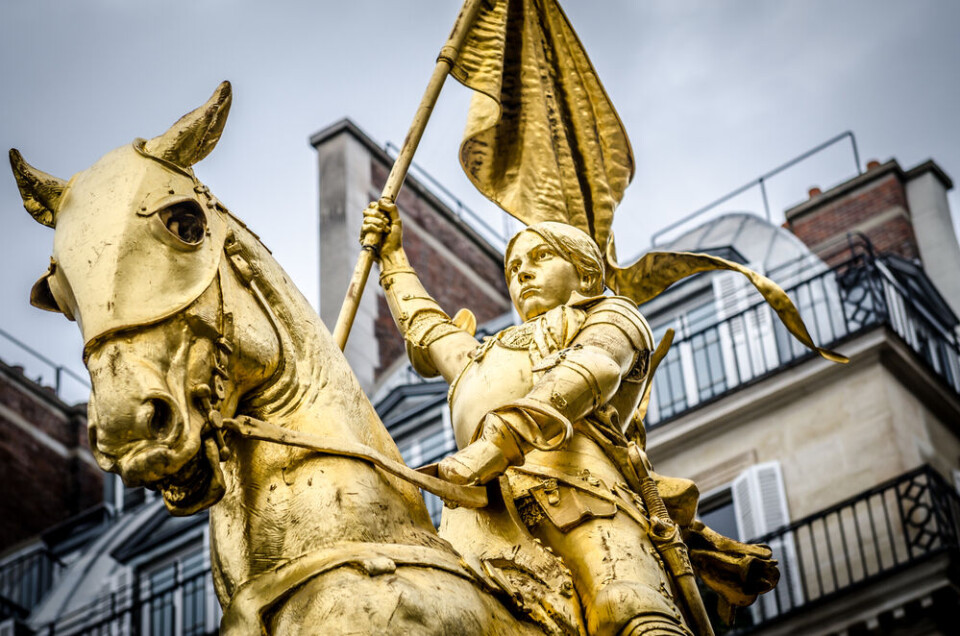-
Visitors to Normandy American Cemetery must soon book in advance
With more than one million visitors last year, the cemetery is one of the region’s most-visited D-Day sites
-
Letters: France's wasteful healthcare system needs a rethink
Reader says it would not be fair to ask people to pay more based on their age
-
Letters: The reality of finding a new doctor or dentist in France
Finding a replacement is nigh impossible, says Connexion reader in Lot-et-Garonne
Are the English really guilty of Joan of Arc’s death?
A far-right tradition of visiting Joan of Arc’s statue on May Day puts the medieval warrior-turned-nationalist symbol in sharp focus

“Vous, les anglais, vous avez brûlé Jeanne d’Arc!” – “You English burned Joan of Arc!” It is a common taunt when a French person wants to score a point against the English. “Do not forget,” they mean, “you murdered our patron saint.”
It is a shame for anyone who holds this to be true that medieval history is a lot more complicated.
The Hundred Years’ War was not the same as England playing France at football. Its latter part was effectively a French civil war.
And Joan of Arc was not a simple cross-dressing heroine. Her career is shrouded in question marks and it cannot be separated from its context.
In 1422, the warrior Henry V of England (“Once more unto the breach, dear friends”) died, shortly followed by France’s Charles VI (first nicknamed ‘the Beloved’ and later ‘the Mad’).
Their offspring both had a claim on the throne of France: Henry VI, who was all of nine months old, and his rival the 19-year-old Charles VII, the fifth Dauphin (heir to the throne), his brothers having died in infancy.
The question was: who would send the other packing? Depending on who you believe (and the records are ambiguous), the teenage Joan of Arc, guided by voices, provided Charles with spiritual legitimacy and military supremacy, lifting the siege of Orléans for him and enabling him to be crowned in Reims in 1429.
After this, she lost her usefulness to the king and her later military career was unsuccessful. She aimed to throw the English out of France but in this she failed. Joan was taken prisoner by the Burgundians (who were French, of course) and sold to the English, who left prosecution to other French people.
Her interrogators and judges are often described as ‘pro-English clergy’, but that claim amounts to French-Catholic spin.
The many accusations against her included heresy for claiming to have revelations direct from God, witchcraft and dressing like a man.
Her French supporters did nothing to save her: the king probably wanted to distance himself from her in case his divine right to rule was tainted with heresy.
After her death on May 30, 1431, she was given a rehabilitating re-trial and found innocent. The Joan of Arc we know today is really an invention of the 19th century Third Republic.
After the humiliating defeat of 1870-1, the country needed a figure to rally around and a legend was born. She became a symbol of nationalistic Catholicism as the power of the state was being eroded by the secular republic.
Church and state were separated in 1905. Joan was beatified (not without controversy) in 1909, and in 1920 she was made a saint, but only on the basis of posthumous miracles attributed to her presence.
The point is not to be missed. It was not the English that did for her. They probably did not care: she was no longer a problem for them, if she ever had been. But we were not and we are not guilty.
“She is the patron saint of France who was charged, condemned, tried and executed by Frenchmen,” says Malcolm Vale, fellow in history at St John’s College, Oxford. “She is a saint of the Catholic Church condemned by a legally constituted tribunal of the Catholic Church.”
I am not telling you this so you can go and win an argument with the French. If I were you, I would not answer them back. That would be like telling someone British that Churchill did not win World War Two.
I am just saying that it is a good question with a perfectly good answer, although not the one your neighbours will want to hear.
Related articles
I read the 5,000-page compendium that tries to explain France
When naming places and streets, France should honour women too
Five historical French quotes (or mis-quotes) and their origins
























